
Evangelicals and Post-Vatican II Roman Catholicism
 2019-07-12
2019-07-12
Leonardo De Chirico speaks about evangelical responses and assessments of Roman Catholicism post-Vatican II. Vatican II was an ecumenical council of the Roman Catholic Church held from 1962–1965 and widely interpreted as bringing the Catholic Church into a new relationship to the world and other religions.
De Chirico analyzes the several prominent evangelical scholars, including G.C. Berkouwer, Cornelius Van Til, and John Stott, in order to identify various strengths and weaknesses in evangelical perspectives on modern Roman Catholicism. De Chirico concludes that evangelicalism typically misses how two foundational aspects of Catholic theology (the relationship of nature to grace and a Christological ecclesiology) serve to undergird an entire theological system.
Leonardo De Chirico planted and pastored an Evangelical church in Ferrara (northern Italy) from 1997 to 2009. Since 2009 he has been involved in a church planting project in Rome and is now pastor of the church Breccia di Roma. He earned degrees in History (University of Bologna), Theology (ETCW, Bridgend, Wales) and Bioethics (University of Padova). His PhD is from King’s College (London) and it was published as Evangelical Theological Perspectives on Post-Vatican II Roman Catholicism (Bern-Oxford: Peter Lang 2003).
More Episodes
 2019-05-03
2019-05-03
 2019-04-24
2019-04-24
 2019-04-23
2019-04-23
 2019-04-12
2019-04-12
 2019-04-09
2019-04-09
 2019-04-05
2019-04-05
 2019-04-03
2019-04-03
 2019-04-02
2019-04-02
 2019-03-29
2019-03-29
 2019-03-27
2019-03-27
 2019-03-26
2019-03-26
Create your
podcast in
minutes
- Full-featured podcast site
- Unlimited storage and bandwidth
- Comprehensive podcast stats
- Distribute to Apple Podcasts, Spotify, and more
- Make money with your podcast
It is Free
- Privacy Policy
- Cookie Policy
- Terms of Use
- Consent Preferences
- Copyright © 2015-2024 Podbean.com


